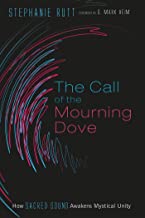The Call of the Morning Dove:
|
|
ENDORSEMENTS
|
|
"With the ear of a poet, Stephanie Rutt has written a lovely book in both tone and content, proposing a new theological paradigm highlighting the power of the sonic realm across religious traditions. Drawing on experiences from her practice as an interfaith minister as well as research into a wide range of prayer practices that engage the “sound of God,” Rutt takes her readers on a fascinating journey and invites them to consider these practices as resources in a human quest for meaning that transcends any single tradition."
Jennifer Howe Peace Associate Professor of Interfaith Studies Andover Newton Theological School "Stephanie Rutt's work is an inspiring intersection of concrete spiritual practice, inter-religious learning and pastoral leadership. The Call of the Mourning Dove continues this pioneering path, in which common human modalities of sound, speech and body become avenues for personal renewal and reconciliation across communities." S. Mark Heim Visiting Professor of Theology/Yale Divinity School Samuel Abbot Professor of Theology/Andover Newton at Yale “Stephanie Rutt’s work on the spiritual inbreaking that takes place when one prays a prayer in its original language blends the mystical meaning of sound with the human quest for connection across times and spaces. In that way, what she creates is truly something new.” Sarah B. Drummond Dean of the Faculty & Vice President for Academic Affairs Andover Newton Theological School Excerpt: Conclusion "Lovers across faith traditions share a fierce yearning for God. While beliefs and practices differ, what ignites the human heart to quest for the unknowable, the holy, the mystery just beyond understanding, is the same. Today this quest is being most loudly articulated by those identifying as “spiritual but not religious.” Yet those “traditionally religious” have long journeyed, labored, and aspired to know God within the lineages of ancient, sacred traditions. While, on the surface, it would appear that Lovers from these two groups are moving in different directions, their quest is the same. Within the Sonic Trilogy of Love, all Lovers encounter the epic human journey inherent in the quest for God as well as moments of mystical unity inherent in the universality of the experience of God. In order for there to be such universality in the experience of God, there must be, ontologically, universal elements within the One, to which all traditions point, eliciting this common response. Perennial philosophy describes such universal elements, three of which are highlighted in this study: the assertion of one divine reality, the notion that life can be seen as miraculous as soon as the religious view becomes dominant, and the belief that observable practical consequences emanate from religious experience. The more recent worldview of panentheism has emerged to provide a new context for holding this universality of experience encompassing both the immanent and the transcendent qualities of God. Simply, there is nowhere God is not if the Lover has the eyes to see. Examining the origins of the historical canons reveals this universality brought forth by the Love, the sound current, embedded within the languages themselves considered in this study: Hebrew, Sanskrit, Aramaic, and Arabic. The four traditions we have engaged all claim possession of the Word as was originally revealed, yet, as we have seen, each tradition expresses, through the key sacred sound practices, common themes pointing to the One: the Shema, AUM, Awoon dwashmaya, and La illaha illa Allah. Hence, rabbis, swamis, priests or ministers, imams or shaykhs, and Lovers across traditions emerge from the kol demamah dakah, nada, nothingness and nowhere, and hu, humbled with awe and able to speak in the language only Lovers know, silence. Yet now, having experienced just a glimpse of the mystery, each starts to see the face of God everywhere, immanent in stones, flowers, eagles, and in the eyes of neighbors, as well as transcendent in the secrets of those very stones, the silent unfolding of the flower’s petals, the wind lifting the eagle from its nest, and, most of all, in the love igniting our hearts when we pause long enough to see the face of our neighbor. As Lovers everywhere hear the call of the mourning dove, each is invited to answer and fulfill a unique part in the Beloved’s plan for creation. In doing so, Lovers discover the joy of harmonizing their notes in service to the divine symphony. Wondrously, they realize that unity with all does not dissolve particularity; rather, it requires and celebrates it. As Lovers enter into the Love, the sacred sound practices, within the Sonic Trilogy of Love, they experience a cleansing of all that stands in the way of this unique expression of particularity and, slowly, emerge to sound their own note in service to a greater good known only to the Beloved. It is in this way that Lovers, whether diving deep into the sound currents of a single tradition or engaging sacred sound practices across faith traditions, discover their unique place in God’s creation intimately woven into the web of life. Simply, each is one and all. As love, that core organizing principle uniting Lover, Love, and Beloved in mystical unity, has its way with us, we hear the call piercing the open sky and we respond as only Lovers can, propelled by a yearning we can’t ignore. Nothing short of feeling the palpable embrace of our Beloved will suffice now. Nothing short of finding our own ecstatic cry escaping unrestrained and free will satisfy. The Love has stirred our awakening and we can hear now the sound of God chiming softly in the wind as we are gently rocked by a kind of lullaby known only to our Beloved. And, as dusk silently descends, we hear the mourning doves sing." |
